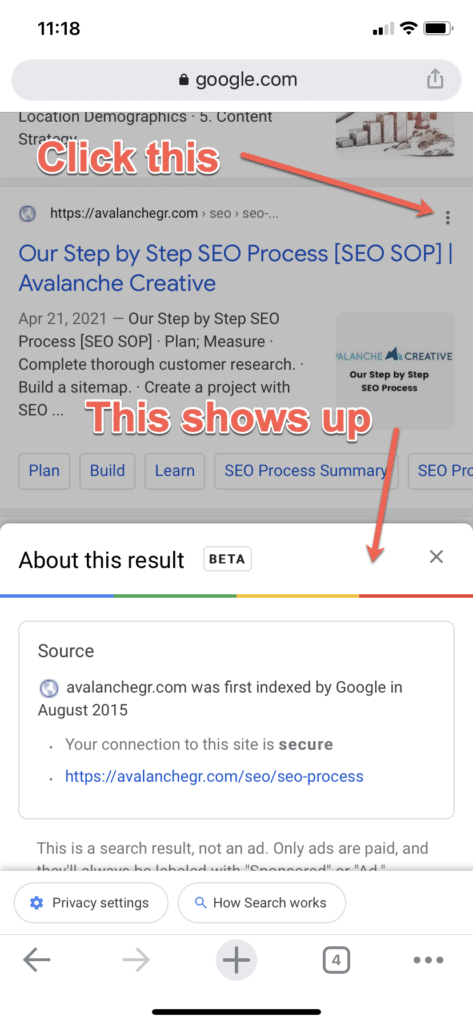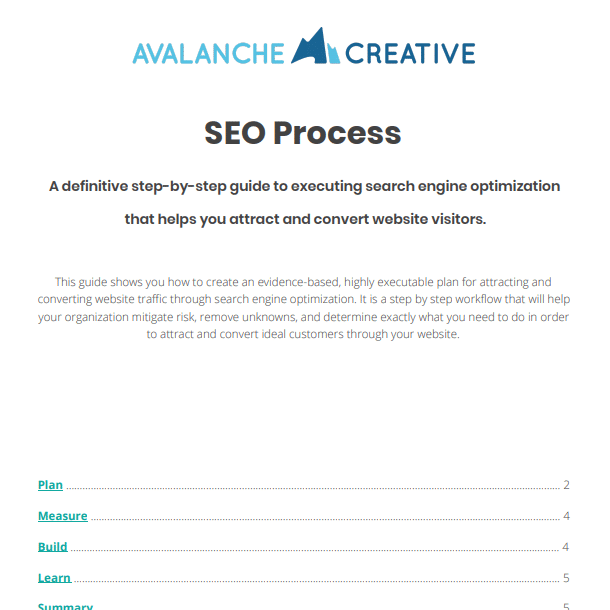Google’s Newest Feature & What You Should Do About it
Category: Search Engine Optimization | Tags: Content Strategy, Digital Marketing, SEO, avalanche email
Learn More and Subscribe to The Avalanche Weekly Email
Today I’m going to talk about Google’s new “About this result” feature.
Go do a google search and hit the three dots icon to the right of an organic search result.
Google is now giving a little more context to why a certain result is ranking. See screenshot below:

- Google is offering this to better communicate to searchers the reason(s) they might have for showing the result.
- Google will show if the site is secure, if Wikipedia has information on that site, and if the search listing is paid or not.
- If the site does not have Wikipedia, it is currently mentioning the date the website was first indexed.
So what does mean for you and your website?
Probably not much right now, unless we can get feedback on how often searchers use the feature and whether or not it affects click-through rates. I don’t think many people are going to click on that little icon, though. They may once or twice out of curiosity, but it’s the title and description that will really get the click.
However, here are a few future implications I want to note:
- The importance of creating a Wikipedia page.
- The importance of having a secure site.
- The importance of the age of your domain and increase in trust over time.
- The importance of overall transparency from Google.
That last one is what I want to talk a bit more about.
Google knows that in order to maintain trust from its users, governments, etc. it has to be willing to give some context clues as to why they show the results they show.
No, they’ll never tell all.
But, that transparency needs to be a call to action TO YOU to also improve your transparency.
I know, transparency means a lot of different things and can look like hundreds of different things.
The only way to truly signal transparency and create a website that is continuously getting better at getting results is by having a process for improvement.
A great process hinges on using a careful mix of evidence and empathy for your audience. Some qualities you’ll need:
- Energy to explore the multiverse of unique experiences that lead people to your website and your website to your customer list.
- Endurance to create better experiences for those people than what currently exists in the world.
- To get rid of the mindset that there is a finish line. Improvement is never over.
Need help with your website improvement process? Let me know. Avalanche is now taking on new clients!
Share this article:
The Avalanche Email: Fun. Simple. Educational. No Selling.
Learn Result-focused SEO & Content
Join over 2,272+ others who get one email every Wednesday with simple instructions on how to get more website traffic and leads through SEO and content marketing. (Learn more about the email)
Keep Learning
How To Show Up in Gemini (And Win More Local Jobs)
Show up in Gemini when homeowners search for landscaping services. Build the right signals on Google and your website to win more qualified local jobs.
How to Run Google Ads for Landscapers: A Complete Guide
Learn how to set up Google Ads for landscapers, attract qualified leads, and win more local jobs with this step-by-step guide.
🏔️ Watering > Planting New Seeds
Your next marketing win may already be on your site. Learn how to optimize existing pages for better rankings, traffic, and results.
The Recipe vs. The Meal
Your customers buy the experience, not the product. Discover a simple way to shift your message from ingredients to the full meal.
🏔️ Hook, Line, and Sinker 🎣
Use this fishing framework to turn your posts into stories that capture attention, create tension, and inspire action from your audience.
🏔️ Avoid Everything That Doesn’t Move You Forward
Stop chasing shiny tools and refocus on what moves your marketing toward the end zone. Simple steps to cut noise and make steady progress.




